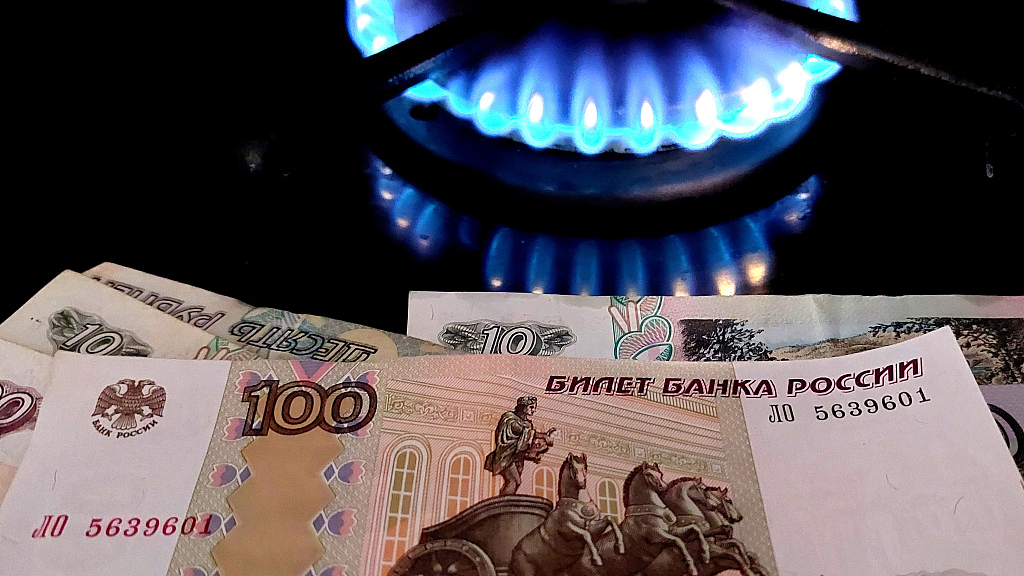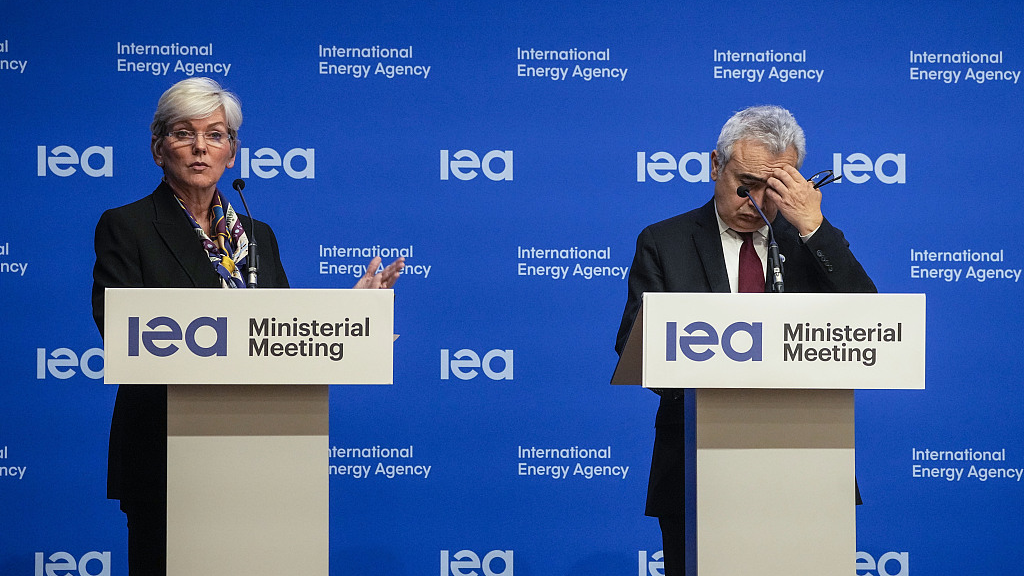
Flames from a gas burner on a cooker and Russian rubles are seen in this illustration photo for paying a gas in Russian rubles, in Sibenik, Croatia, March 24, 2022. /VCG
Flames from a gas burner on a cooker and Russian rubles are seen in this illustration photo for paying a gas in Russian rubles, in Sibenik, Croatia, March 24, 2022. /VCG
Editor's note: Seymur Mammadov is the director of the international expert club EurAsiaAz and editor-in-chief of Azerbaijan news agency Baku Tribune. The article reflects the author's opinions and not necessarily those of CGTN.
Recently, Russian President Vladimir Putin announced that Russia is switching from euros and dollars to rubles in payments for natural gas supplies to buyers from unfriendly countries. He cited the fact that Western currencies, traditionally used to pay for Russian gas, have "compromised" themselves. Putin has made it clear that this is only the beginning. Later, Deputy Prime Minister Alexander Novak also said that it had become unreliable to trade oil for dollars and euros, and in the future it is necessary to switch to settlements in national currencies here as well.
Europe, of course, is furious with the Kremlin's decision, since there is a big risk of being left without gas if the Russian proposal, which is a de facto ultimatum, is rejected. The Russian president said that other terms of the contracts would not be reviewed. This means that the pricing formula will remain exactly the same as before. Buyer companies will buy Russian gas in the original dollar price.
The new procedure for paying for gas with Europe is that, if previously foreign companies directly settled with Gazprom in dollars and euros, now they will transfer these currencies to certain companies on the stock exchange in exchange for rubles, which will go to Gazprom bank accounts. In fact, a new link is added to the gas chain. From a technical point of view, no problems should arise with Russia's new payment proposal. But, difficulties may arise when European companies look for companies on the stock exchange from which they can buy rubles, since Europeans will, first of all, have to make sure that these companies are not under sanctions.
Although the easiest way would be to buy a chunk of Russian rubles from the Central Bank of Russia, the Europeans themselves placed this bank under sanctions, which negatively affects them. The Russian ultimatum "pay for gas in rubles" is a matter of principle for the Kremlin, as half of its Central Bank's gold and foreign exchange reserves have been frozen. This is about $300 billion. This ultimatum is a definite message to Europe, which means: "If you remove sanctions on the Central Bank, you will live easier."

U.S. Secretary of Energy Jennifer M. Granholm (L) and International Energy Agency (IEA) Executive Director Fatih Birol attend the closing media conference at the ministerial meeting in Paris, France, March 24, 2022. /VCG
U.S. Secretary of Energy Jennifer M. Granholm (L) and International Energy Agency (IEA) Executive Director Fatih Birol attend the closing media conference at the ministerial meeting in Paris, France, March 24, 2022. /VCG
Gazprom will have to send a draft supplementary agreement to all its counterparties. Changes have been made to only one clause of the contract, which specifies the currency in which payments for the supplied gas are made. And if the companies sign this additional agreement, they do concede their dependence on Russian gas. In fact, reading between the lines, the Russian ultimatum is: "Either we switch to payments in rubles, or we don't sell gas to you."
By the way, Russia is most criticized by those countries whose contracts with Gazprom expire in 2022. These include Poland and Bulgaria. For them and other European countries, a dramatic situation is emerging - the heating season ends, and they leave it with devastating gas storages. European countries now just need to buy a lot of gas in order to prepare for next winter.
If the European Commission, for example, intervenes in this issue and makes a decree banning the transfer of payments for gas to rubles, Russia can take this as a sanction and say: "Since you do not send us rubles, it means you refuse to pay for gas, then we turn it off." First, such an approach by Europe to the Russian ultimatum may lead to a breakdown in gas purchases. Second, Russia may impose a ban on the supply of oil and coal, which will lead to a global energy crisis. Europe ditching Russian gas and oil will result in very serious consequences for the Europeans themselves. On one hand, this is an inevitable rise in gas prices around the world. On the other, it will lead to power outages in Europe, since part of the electricity supply is produced using gas. This begs the question - how will Europe prepare for next winter without Russian energy supplies? In this case, Europe will have to stock up on coal, but will Russia supply coal to European countries? Russia is one of the largest suppliers of coal on the world market, second only to Indonesia and Australia in terms of volumes. As of 2019, Russia is the largest coal supplier to the EU with a 47 percent share.
So economy-wise, not only Russia itself will suffer from the sanctions, but also European countries. The interests of the EU will also suffer from a political point of view, since the economic war declared on Russia will further strengthen the position of the United States in Europe, increase the dependence of European countries, especially Germany and France, on the United States.
As a point, the statement of French President Emmanuel Macron that Europe should create its own army to protect themselves will be recalled. Germany also supported the idea of creating a single European Armed Forces. This idea turned out to be just a figment of their imagination, and I do not think any of the European politicians will dare to mention it in the future. Because in the new emerging world order, Europe will have tough days ahead. Europeans will have to endure serious economic difficulties. The EU has suffered a geopolitical defeat and will for a long time lick the wounds inflicted on themselves with the help of the United States.
(If you want to contribute and have specific expertise, please contact us at opinions@cgtn.com. Follow @thouse_opinions on Twitter to discover the latest commentaries in the CGTN Opinion Section.)

